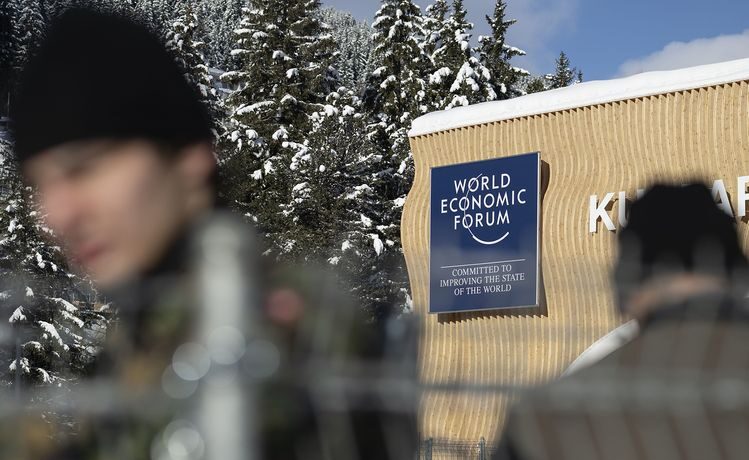Leading figures in the financial sector are shunning Davos this year, as the World Economic Forum fights to compete with a growing number of rival conferences around the world.
Bank of England governor Andrew Bailey, Dame Anne Richards of Fidelity International, John Studzinski of Pimco and Hendrik du Toit of Ninety One have all opted out. Also giving the event a miss are private equity firms Clayton Dubilier & Rice and BC Partners. One firm whose chief executive has been a regular at the Swiss alpine resort said they had decided to stop going as a result of “conference fatigue”.
Sir Martin Sorrell, founder of advertising giant WPP, will be attending Davos but said that while the WEF remains important, it is “less prominent than it was by virtue of competition” from other global events. These include CES, the tech conference that took place in Las Vegas this month, the Sun Valley conference in Idaho that is attended by billionaires in the summer, Saudi Arabia’s Future Investment Initiative — dubbed ‘Davos in the Desert’ — and the annual COP climate change conference.
COP has become popular with financial services firms, with some believing it is better for their image and has a bigger impact than Davos.
Last year’s COP28 in Dubai saw countries agree to transition away from fossil fuels and set up a fund to compensate developing countries for “loss and damage” from climate change.
Financier-turned-activist Bill Browder, who attended Davos for more than 25 years, stopped going last year, after the organisers increased the entry price from $70,000 to $250,000.
“No person in their right mind would pay that to attend so you end up with mostly corporate executives and many important voices priced out,” the Hermitage Capital Management CEO said. “The WEF has turned into such a corporate money-making machine that the real purpose has been subordinated and almost extinguished.”
Ninety One chief executive du Toit is one of the industry leaders who is now a regular at COPs but has stopped going to Davos.
Other firms not attending Davos this year include Japanese tech investor SoftBank. Its founder, Masayoshi Son, went in 2020.
Studzinski has made the annual trip to Davos since he worked at Morgan Stanley in the 1990s. Now vice-chair of Pimco, he was joined at Davos in 2020 by the giant bond manager’s chief executive Manny Roman. But Pimco will be a no-show this year.
READ Why worry? Top finance executives on the year’s biggest risks
Richards has been a frequent visitor to Davos both for her current job as chief executive of Fidelity International and formerly as head of M&G Investments.
But she isn’t attending this year and neither Fidelity International nor M&G will be represented.
Mohamed El-Erian, chief economic adviser of Pimco’s parent company Allianz, hasn’t gone to Davos “in decades”.
He said the organisers’ push to make the annual summit bigger has backfired. “The organisers have made a major effort to expand attendance in order to counter what has been viewed by many as too narrow an approach to cognitive diversity.” He added that Davos’s major discussions have still “tended to miss quite a few changes in the global economy”.
Frustrating logistics
UK investment managers are increasingly thin on the ground in Davos. Legal & General Investment Management doesn’t go and only Schroders’ impact investing arm BlueOrchard will be representing it.
Standard Life Aberdeen — now Abrdn — declared in 2020 it would no longer turn up to run its whisky bar complete with bagpiper. Keith Skeoch, then chief executive, described Davos as “divisive” and said the firm had better things to spend money on.
Xavier Rolet, the former boss of the London Stock Exchange, is also not attending Davos. He said the location of the annual conference is inconvenient for attendees.
“The practical considerations of attending Davos as regards travel, accommodation, dining and daily access to events, conferences and meetings can be quite frustrating, notwithstanding their financial and environmental costs. It is doubtful in my mind that the location itself is still appropriate and suited to such a large event,” he said.
Meanwhile, a spokesperson for the Bank of England confirmed to Financial News that the UK central bank would not be attending. Former governor Mark Carney was a regular, often addressing the conference with speeches on everything from the UK economy to climate change.
Some investment firms have pulled out, but a WEF spokesperson said six more top executives from investor firms will nevertheless be participating this year.
BlackRock will be sending its usual delegation of about 10. “We use Davos to meet with clients and we have a full schedule of client meetings again this year,” said a spokesperson.
Other big industry names at Davos this year include Blackstone’s Steve Schwarzman, KKR’s Scott Nuttall, Carlyle’s David Rubenstein and TPG’s Todd Sisitsky.
Banking on it
In contrast to the asset managers, there seems to have been little pullback by the big banks: JPMorgan, Goldman Sachs, Morgan Stanley, Bank of America, Citi, UBS, Barclays, Standard Chartered, Lloyds and HSBC are all sending teams headed by the CEO (or the CEO of Europe in HSBC’s case).
A spokesperson for the WEF said that the statements in FN’s article “do not accurately represent the overarching sentiment and engagement” of the summit. They pointed to its 2,800 attendees including 1,600 business leaders.
READ Private credit, dealmaking and… Credit Suisse? Where growth will come from in 2024
“The Forum provides the structure for an exchange of ideas and initiatives that promote cooperation between its partners and constituents throughout the year. [This] week’s annual meeting will serve as an accelerator of that cooperation, at a time when global challenges require urgent solutions, from reviving growth and harnessing technology to promoting security and climate action,” they said.
To contact the authors of this story with feedback or news, email David Wighton and Shruti Tripathi Chopra
















